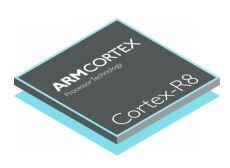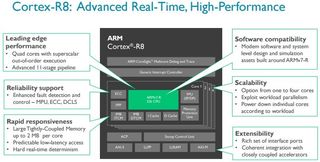ARM's Real-Time 'Cortex-R8' CPU To Power Next-Generation 5G Modems, Storage Products

ARM announced its most powerful real-time processor ever, the “Cortex-R8,” which will target next-generation LTE-Advanced Pro as well as 5G modems, but also storage products such as HDDs and SSDs.
ARM’s Cortex-R series of processors represent the number-one architecture in storage products, and it’s used by all the major HDD and SSD manufacturers, according to ARM.
Gartner, a market research firm, has said that between 2015 and 2019, the average enterprise storage device capacity will increase by four times. Thanks to the transition from SATA to PCIe, the increase in Input/Output (I/O) operations per second has also increased 300%. All of this will require more deterministic processing, which is why higher-performance real-time processors such as the Cortex-R8 are needed.

ARM also claimed that its architecture has been the most popular in cellular modems as well, ever since the first GSM handset came out. The new Cortex-R8 should be powerful enough to run in both LTE-Advanced Pro modems, which can reach up to 1Gbps download speeds, but also multi-Gbps 5G modems when they start appearing in the next few years. ARM estimated that the throughput from LTE Release 8 to 5G Wave 2 (10+ Gbps) will increase 50 fold.
“5G will revolutionize mobile communications as it delivers the ability to significantly increase data rates, offering a far better mobile experience,” said James McNiven, general manager, CPU Group, ARM. “The Cortex-R8 is the most powerful real-time CPU available and its unrivaled performance will make it instrumental in the creation of 5G modems. It will form the communications heart of future smartphones, tablets, connected cars and IoT,” he added.
The Cortex-R8 is a 32-bit superscalar and out-of-order CPU that can support 1-4 cores and achieves a maximum performance of 18,000 DMIPS. Its cores can be powered on and off as necessary, and the workload can be spread out across all four of them.
It has an 11-stage pipeline, advanced data integrity features (ECC, MPU, DCLS) and rapid responsiveness thanks to the 2 MB/core tightly coupled memory and predictable low-latency access. The chip can respond to an external event in less than 1 microsecond, according to ARM.
Stay on the Cutting Edge
Join the experts who read Tom's Hardware for the inside track on enthusiast PC tech news — and have for over 25 years. We'll send breaking news and in-depth reviews of CPUs, GPUs, AI, maker hardware and more straight to your inbox.

The Cortex-R8 has a high degree of extensibility due to its coherent integration with closely tied accelerators and a rich set of interface ports. All modern software for ARM chips is also built around the ARMv7-R architecture, so it should have a high-level of software compatibility, as well.
ARM expects to see mass storage devices powered by the Cortex-R8 this year. LTE-Advanced Pro and 5G modems should arrive with it in the near future. Huawei is one of ARM’s customers that has already announced that it will adopt the Cortex-R8 in its 5G modems.
Lucian Armasu is a Contributing Writer for Tom's Hardware. You can follow him at @lucian_armasu.
-
problematiq Last I heard they were still trying to decide what 5G "Will" be. Something change in the past 3 days?Reply -
bit_user ReplyThe chip can respond to an external event in less than 1 microsecond, according to ARM.
I guess that's not bad, if it's a worst-case figure. Still seems kinda long.
Still uses ARMv7-R ISA. Same as R7.
Most Popular


